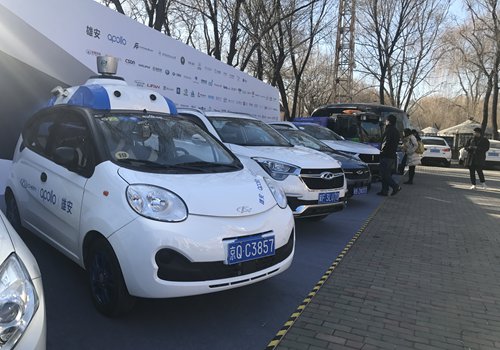
Baidu's Apollo vehicles on display (Photo: Huang Ge/GT)
China's Internet giant Baidu Inc on Wednesday signed strategic cooperation agreement with Xiongan New Area Administrative Committee, North China's Hebei Province, aiming to help build the economic zone into a new benchmark of artificial intelligence (AI) city.
Baidu said it will strengthen cooperation with Xiongan in sectors including smart traveling, AI technology and cloud infrastructure. The company also announced with the provincial government of Hebei to jointly set up a national AI laboratory.
On Wednesday, Baidu sent five autonomous cars powered by its driverless technology platform Apollo on a 4-kilometer test drive in Xiongan.
Baidu hopes to help Xiongan construct AI infrastructure and become a world-class smart transportation city with efficient transport, Baidu CEO Robin Li Yanhong said.
Baidu launched its driverless technology platform Apollo in April, and realized closed venue tracking for autonomous driving in July, Lu Qi, president and chief operating officer of Baidu, told the first board meeting of Apollo in Xiongan.
Lu said that the Apollo platform tested fixed lane autonomous driving in September and will test simple urban road conditions in January 2018. Baidu will invest 10 billion yuan ($1.5 billion) in more than 100 autonomous driving projects over the next three years, said Lu, noting that the company will form further ties with Xiongan as the new area focuses on the development of AI technology and big data.
Chen Gang, director of the Xiongan New Area Administrative Committee, said in October that the new area will focus mainly on smart and public transportation, with autonomous private cars as a personalized option, according to the Xionganfabu WeChat account.
The cooperation offers a good opportunity for Baidu to test and promote its driverless technology in the new area, where local authorities are likely to roll out infrastructure construction plans for driverless vehicles, especially such road-support facilities as traffic lights, Wu Shuocheng, an independent industry analyst, told the Global Times on Wednesday.
Wu said that the main challenge is still the maturing of Baidu's driverless technology, if the company wants to deepen cooperation with the new economic area, which will focus on the high-technology industry.
"More and more technology companies that have tapped into the autonomous car industry will choose to seek cooperation with the new area," Wu forecast.
Chinese authorities have not unveiled any regulations that allow fully automatic vehicles to hit the road.
Beijing authorities released a new regulation on Monday allowing legal entities registered in China to apply for temporary permission to drive automatic vehicles on certain test roads, but the vehicle has to be equipped with both automatic and manned driving modes.


















































